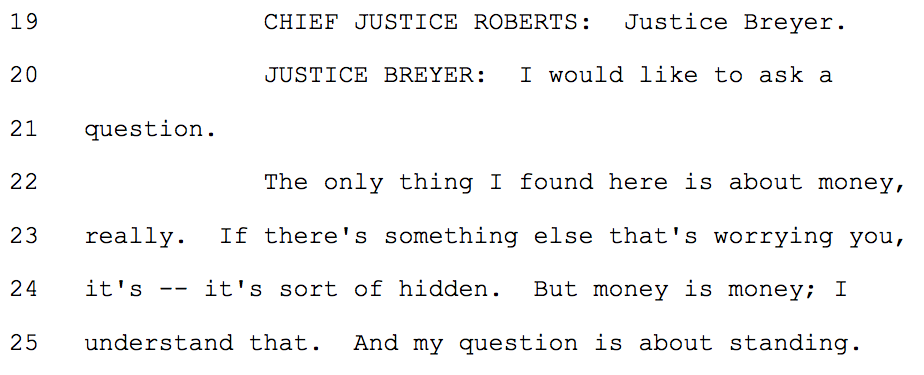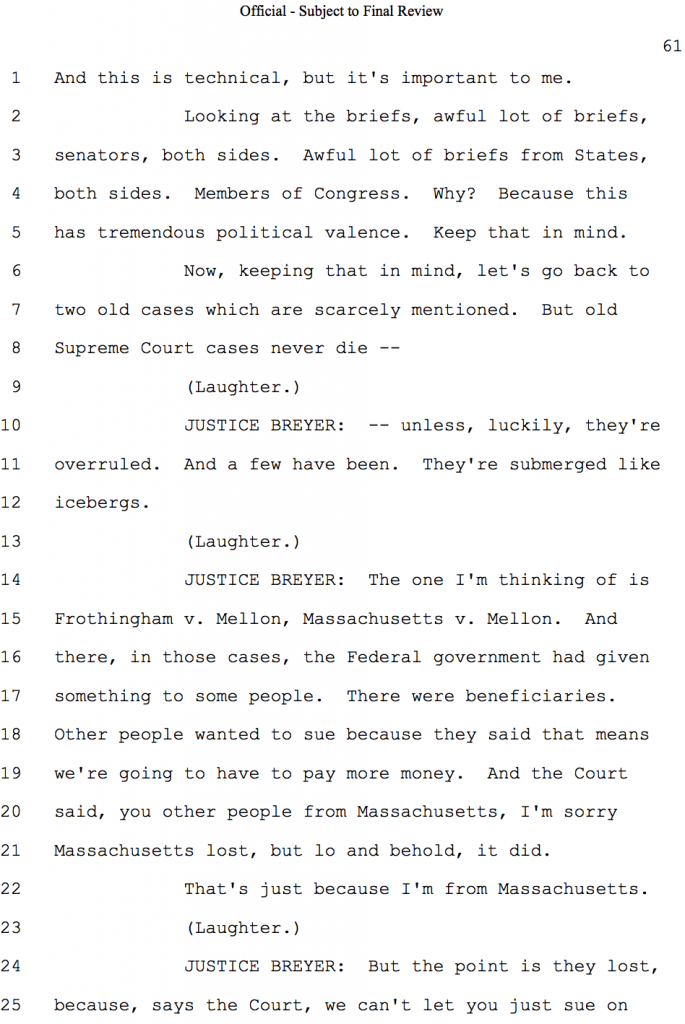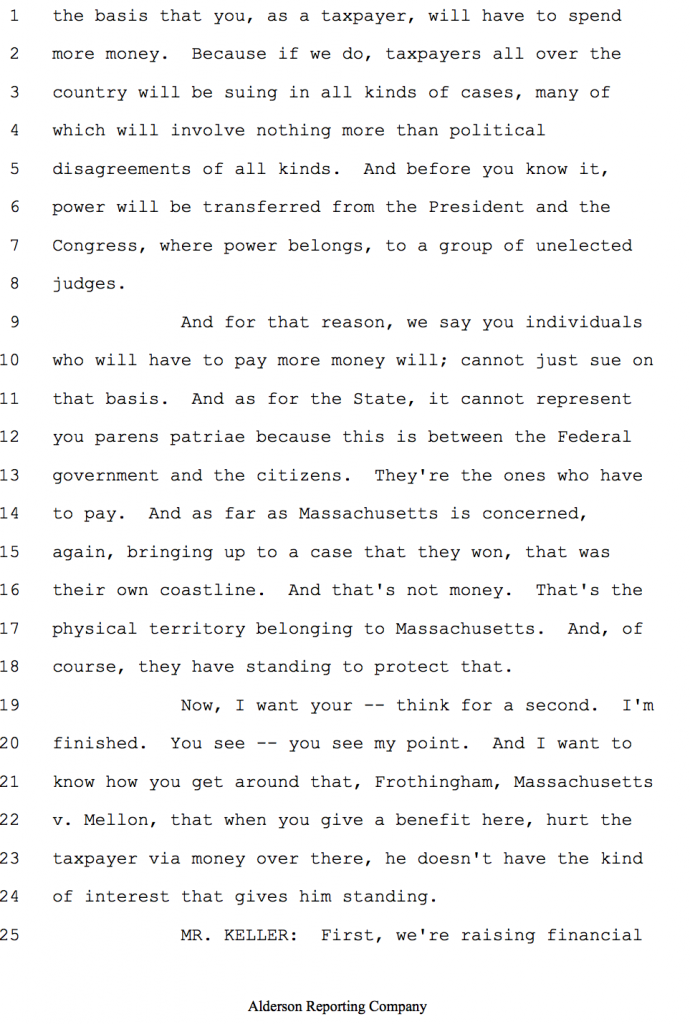You can download it here. I will have commentary soon.
Update: The brief of the United States is here.
While preparing an article for National Review on the oral arguments in U.S. v. Texas, I realized I included an erroneous citation on p. 28 of the amicus brief I co-authored for the Cato Institute and Professors Jeremy Rabkin and Randy Barnett. Today, Ilya Shapiro (counsel of record) served the Clerk of Court and counsel with a letter notifying them of the mistake. Here is the content of the letter:
Re: Brief Amici Curiae for the Cato Institute et al., United States v. Texas, No. 15-674
Dear Mr. Harris,
It has come to my attention that Cato’s brief in the above-referenced case has an erroneous citation that is worth correcting, out of my duty of candor to the Court, because it relates to an important point that is otherwise unsupported.
In our brief on page 28, we have the following sentence:
After the president announced the program, the House of Representatives resolved that the executive action was “without any constitutional or statutory basis.” Preventing Executive Overreach on Immigration Act of 2015, H.R. 38, 114th Cong. (2016), available at https://goo.gl/naJviy.
That citation is incorrect. The resolution that passed the House was the Preventing Executive Overreach on Immigration Act of 2014 (https://www.congress.gov/bill/113th-congress/house-bill/5759/actions), not the 2015 version. Accordingly, the citation should read: Preventing Executive Overreach on Immigration Act of 2014, H.R. 5759, 113rd Cong. (2016), available at https://goo.gl/oDYHp1.
While the error may seem trivial, the citation that currently appears references a bill that never made it out of committee and so cannot stand for the proposition that Congress repudiated DAPA. This all of course relates to the Take Care Clause issue that the Court added to the cert. grant—specifically Youngstown’s third tier of presidential authority, when executive power is at its nadir because it goes against congressional policy.
Please accept my apologies for the error and any resulting confusion.
All records are made to be broken–especially when Justice Breyer begins a hypothetical in a closely divided case where counsel are sharing a limited amount of argument time. In U.S. v. Texas, Justice Breyer engaged in a 52-line, three-page uninterrupted monologue about the issues of standing. (I excluded three lines for “laughter” as those were not remarks by Breyer). This is a remarkably long observation, without even the pretense of offering a question at the end. I was in the Court, and it seemed to drag on forever.



I was in the Court for his 49 lines in Zubik v. Burwell. His previous record was in 44 lines in Hosannah-Tabor. In Bond, he spoke for 38 lines uninterrupted. 36 Lines in FERC v. Electric Power Supply Association. He went 32 lines in Medtronic v. Boston Scientific Corp. He had 35 lines in EPA v. EME Homer. In Franchise Tax Bd. of Cal. v. Hyatt, Justice Breyer spoke had 34 lines. Alas, only 27 lines in Zivotofsky.
A few weeks ago, I was researching originalism and confirmation hearings for a piece I am writing with Randy Barnet for the Chicago Law Review Online (stay tuned), and came across a reference to Justice Brennan’s confirmation hearing. I read in a book on hearings that the patron saint of living constitutionalism declined to answer a question about whether “the Constitution and amendments thereto have a fixed and definite meaning when they are adopted.” (How prescient!). I wanted to find the context of the quotation, so I checked the Library of Congress’s Finding Aide for the Brennan papers on his hearing.
As I was scrolling through the document, I noticed that there was an entire box of files for correspondences from his law clerks, including Merrick Garland. (There were also folders for Richard Posner, Michael McConnell, Marsha Berzon, and Donald Verrilli, among many others). I asked Ilya Shapiro at the Cato Institute to assign one of his associates, Frank Garrison, to investigate. He went to the Library of Congress, and the Librarian told him that the box was restricted, and “he doesn’t know how long it will take the collection to respond, and he is not sure they will say yes.” I then checked with Steve Wermiel–author of a great biography about Brennan–who told me that the papers were sealed for 20 years after Brennan’s death in 1997. Alas, the papers will not be available until July 2017.
Now, Tony Mauro has the rest of the story:
Jeffrey Flannery, head of reference and reader services in the manuscript division of the Library of Congress where the papers are housed, on Tuesday identified Stephen Wermiel, a professor at American University Washington College of Law, as the executor of the Brennan papers. Wermiel is co-author of Justice Brennan: Liberal Champion, a 2010 biography of the justice and has not been known to be an executor until now.
Wermiel confirmed he is an executor of the Brennan papers—but not the only one. He declined to identify the other. The Library of Congress, he said, “prefers not to discuss” the identity of executors of papers in its custody.
As for why the Garland file is not being made public, Wermiel said, “The file on Merrick Garland, like files of all of Justice Brennan’s other law clerks, is presently closed until 20 years after his death, as part of the terms of the justice’s original bequest of the papers to the library.”
…
The Library of Congress has told those inquiring about Garland’s file—in Box 120 of Part II—that it is not available; librarians have provided a form to request that an exception be made. This reporter’s written request was denied in an email from Flannery that stated, “Your request to access the restricted portion of the William J. Brennan Papers, specifically container II: 120, has been denied by the executor of the Brennan Papers.”
…
Wermiel said Brennan kept a file for every law clerk who worked for him “and those files tend to be filled with personal correspondence like wedding invitations, birth announcements and holiday greetings.”
Tony quotes me in the piece, and how I came across the folder:
Court scholar and blogger Josh Blackman was doing unrelated research in Brennan files recently when he saw that the justice’s papers included a folder on Garland. He soon learned that the Garland file was off-limits.
“More likely than not, there is nothing of interest in the papers,” said Blackman, a professor at South Texas College of Law. “But it would have been illuminating to review any questions Garland asked of Brennan—especially if Garland inquired about the path to becoming a judge at various stages of his career.” Blackman noted that Brennan died in July 1997, only a few months after Garland was confirmed as a judge on the U.S. Court of Appeals for the D.C. Circuit in March 1997.
Till July 2017! You can review the finding aid here.
At least I will be able to find Brennan’s papers in my lifetime. His replacement–Justice Souter–has locked down his paper still 50 years after his death. It’s even worse than the rule against perpetuities, which is limited to life in being, plus 21 years! Mike Sacks and I have a pact to read the papers, as we will be in our early 100s at the time. We may be only people still alive who actually care what Souter wrote. (Which may encourage Souter to extend it to life in being plus 75 years!).
I have never seen such a large demonstration outside the Supreme Court. There were so many people crowded onto the streets that the police blocked off traffic on First Street. I shared some of the photographs and videos in this album.
Scene outside #scotus pic.twitter.com/BWbhoWXKOP
— Josh Blackman (@JoshMBlackman) April 18, 2016
Scene outside #scotus pic.twitter.com/9M35Rb5lDt
— Josh Blackman (@JoshMBlackman) April 18, 2016